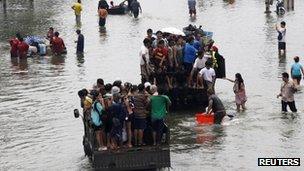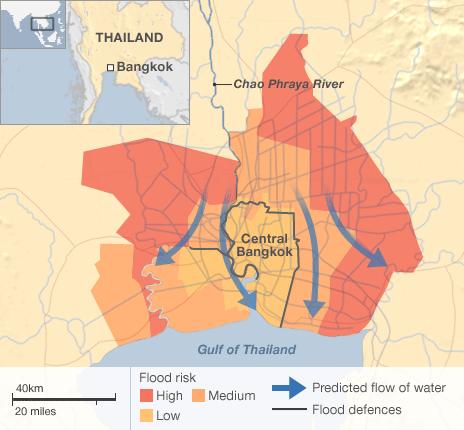Thailand floods: Bangkok 'impossible to protect'
- Published
Aerial footage shows flooded Bangkok districts
The Thai government says it will be impossible to protect all of the capital from flooding because of a build-up of water to the north.
Prime Minister Yingluck Shinawatra said sluice gates would be opened to allow a controlled release of water through parts of Bangkok.
Describing the flooding as a "national crisis", she said officials were doing all they could to solve the problem.
Over 320 people have died in the floods across the country since July.
Central Bangkok is protected by flood barriers which have been reinforced by troops in recent days.
But the run-off from severe flooding in central parts of the country has built up to the north of the capital, and several northern suburbs are already under water.
'Every direction'
On Wednesday, officials urged residents in seven Bangkok districts to move their possessions to higher ground in preparation for possible flooding.
Ms Yingluck said that every way of slowing the water entering the city had been tried.
"We cannot block the water forever," she said. "We need areas that water can be drained through so water can flow out to the sea."
The problems have been exacerbated by high tides, forcing water back up swollen rivers.
"Flood waters are coming from every direction and we cannot control them because it's a huge amount of water," the prime minister said.
"This problem is very overwhelming. It's a national crisis so I hope to get co-operation from everybody."
Ms Yingluck said the government would work out which parts of the city to send the floodwaters through. The Bangkok Post reported that eastern districts were most likely to be hit.
The BBC's Rachel Harvey, in Bangkok, says that the authorities are now having to decide which parts of the nation's capital should be sacrificed in order to protect others.

Over a third of Thailand's provinces have been inundated
Ms Yingluck, who was elected in July, has faced criticism for giving what many in Thailand say has been unclear or conflicting information about the disaster.
Many say that mixed messages from the government led to confusion over the real level of threat to Bangkok, which some officials had suggested would be spared.
The floods - Thailand's worst in decades - have been triggered by heavy monsoon rain that began in July. More than one third of the country's provinces have been inundated.
Some nine million people have been affected over the three-month period, with northern and central areas badly hit in the early stages.
Manufacturing has been hit because several large industrial estates have been forced to close. About 1,000 factories have had to shut.
Japanese electronics company Sony says it has postponed the launch of several products due to disruption at its Thai factories.
On Thursday, the central bank said the damage to industry amounted to over 100bn baht ($3.3bn; £2.1bn).
Meanwhile, rice traders have said that some 3.5m tonnes of paddy have been damaged by the floods. Thailand is the world's biggest rice exporter.
Bank of Thailand governor Prasarn Trairatvorakul has warned that growth this year could be more than one percentage point less than the 4.1% forecast.
But analysts say the loss could be double if Bangkok - which accounts for some 41% of GDP - is hit.

- Published20 October 2011
- Published19 October 2011
- Published15 October 2011
- Published13 October 2011
- Published11 October 2011